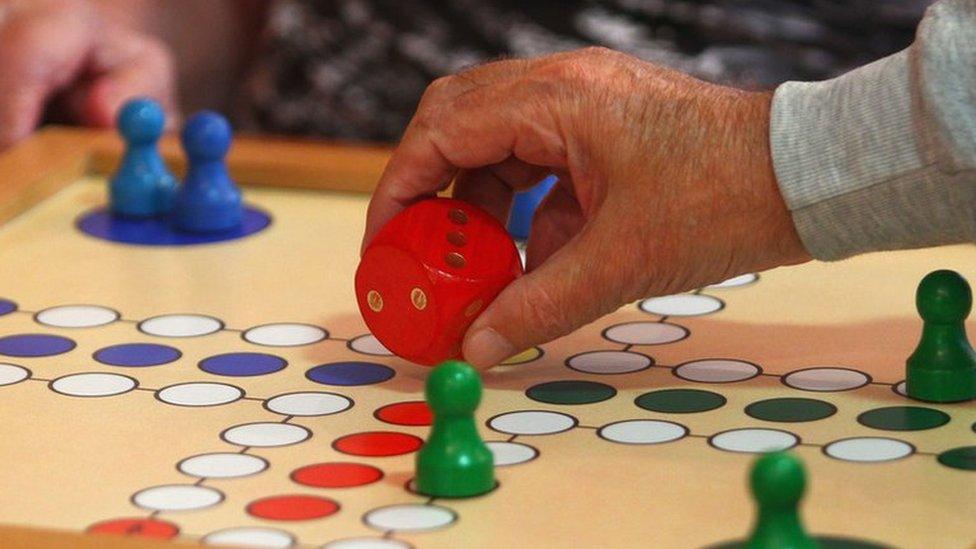Scrabble Together: 'It feels a bit like cheating'
- Published
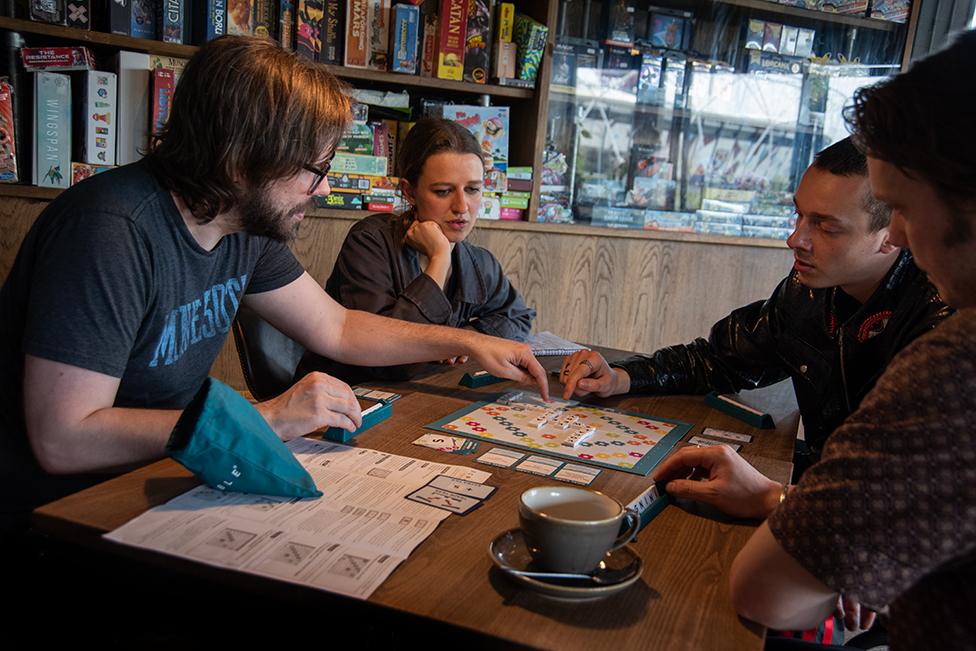
(Left to right) board game cafe owner Tim Willoughby, BBC journalist Anna Lamche, Raph Hӧfer and Robert Fincham play 'Scrabble Together'
This week, for the first time in its 75-plus year history, a new "collaborative" version of Scrabble was launched in an attempt to entice Generation Z players to the traditional word-making game.
I went along to a board game cafe to try out the game that has, in the words of some critics, "gone woke".
Joining me are a motley crew of all ages and abilities at Rule Zero, a games bar and café sitting in the shadow of London's Queen Elizabeth Olympic Park in Stratford.
"I would hate you so much if this was normal Scrabble," 23-year-old Raph Hӧfer says as he watches cafe owner Tim Willoughby place an impressive, long word on the board.
But this is not "normal Scrabble": the new game, which will soon go on sale across Europe, is designed to encourage players to work together, rather than competing against each other.
It's easier than the original: instead of scoring points, players of Scrabble Together aim to work collaboratively to win "goal cards".
These cards set the players challenges such as "play a word containing at least three different consonants".
There is no time pressure, and players can only win or lose as a group. The game ends when the players complete 20 goal cards - resulting in a collective win - or when the challenges set by the goal cards cannot be completed - finishing in a collective loss.
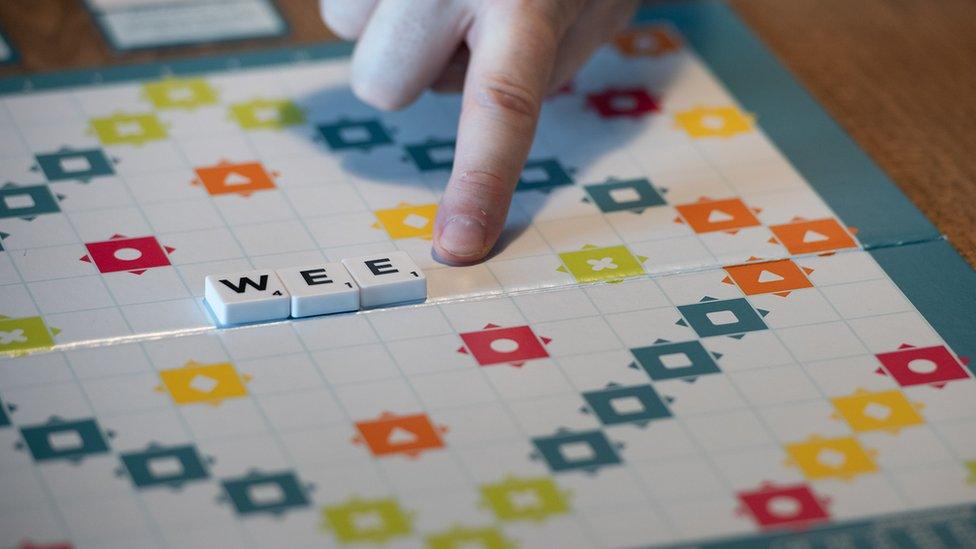
Rob kicks off the game with an easy word "so that whoever’s going next has a slightly easier time"
If the game grinds to a halt, there are "helper cards" that get players out of a sticky situation.
The numbers on the tiles, so crucial in the original game, are largely meaningless in Scrabble Together. As Raph puts it, with an air of mild disappointment, "the numbers are just for decoration."
We're playing in Rule Zero's Games Library, in a snug corner of the upper floor, beneath shelves of games like Cluedo, Catan and 7 Wonders. As the founder of board game cafe, it is unsurprising to find Tim is a bit of a pro at the original Scrabble.
A genial character wearing thick glasses and a backwards baseball cap, Tim explains he played Scrabble regularly throughout the pandemic. The games enthusiast, 41, likes the new version because it could tempt players "intimidated" by the original word game to play against (or with) him.
Sitting opposite Tim is musician Robert Fincham, 32, who lives in a nearby warehouse in Hackney Wick. Rob, who agrees to join us on his lunch break, wears a patterned shirt unbuttoned to reveal what looks like a tattoo of a bird.
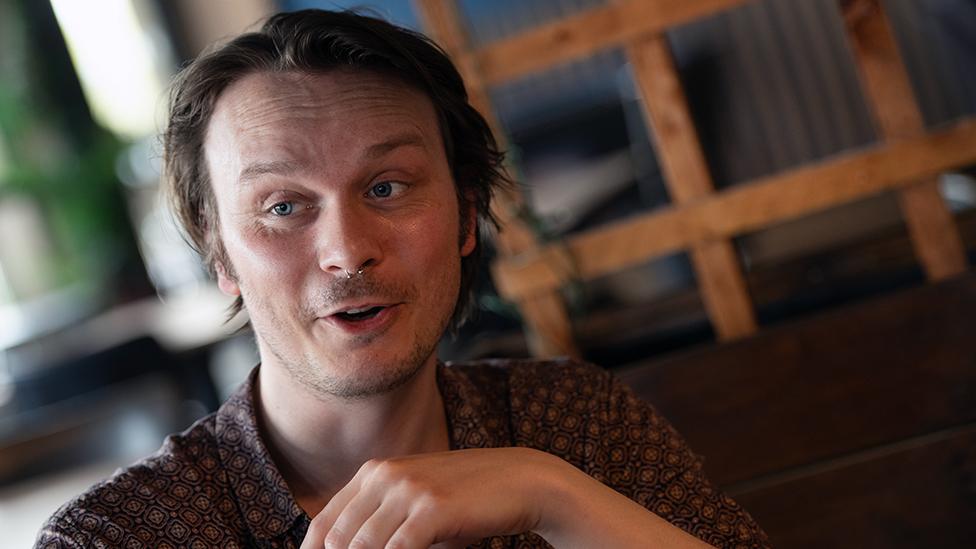
Robert felt the game was "not competitive at all"
Robert, who describes himself with a smile as "massively dyslexic", explains he has only played the original Scrabble once before.
Still, he's left unsatisfied with this version of the game. "It's not competitive at all - it was a bit like being guided through it," he says.
Speaking to Radio 4's Today programme, broadcaster Gyles Brandreth said: "The makers of Scrabble found that younger people, Gen Z people, don't quite like the competitive nature of Scrabble.
"They want a game where you can simply enjoy language, words, being together and having fun creating words."
But 23-year-old Raph, a recent graduate and former basketball player who measures just shy of seven foot, isn't convinced. Towering over everyone even when sitting down, Raph says his sporting background means "competitiveness for me is no problem".
And he is fond of the original Scrabble - his European parents are "big fans of the game: when they first started dating, they used it to teach each other English", he explains.
The game moves quickly and we find ourselves - in Tim's words - "rocketing through", winning goal cards at every turn. The whole experience feels a bit like cheating.
Scrabble is, for me, a game that is dusted off once a year at Christmas.
And while I am a distinctly unremarkable player, the joy of Scrabble has always been in the competition - the occasional wins stolen from the jaws of what seemed like inevitable defeat.
What are board games for?
As we pack the cards away, the experience of playing the game sparks something of a philosophical discussion. We ask ourselves: what are board games for?
Do they exist to teach us about competition, resilience, and losing with good grace?
Or, in a world that seems more polarised than ever - with our country in the grip of what is sometimes called a "loneliness epidemic" - are board games there to bring us together, to show us how to work collaboratively when we have problems to solve?
While we can sympathise with both perspectives, Robert seems to capture the group's shared feelings: "You have to learn to deal with rejection… it's healthy to fail and get back up and give it another go. Whether that's in a board game or in life."
Related topics
- Published9 April 2024
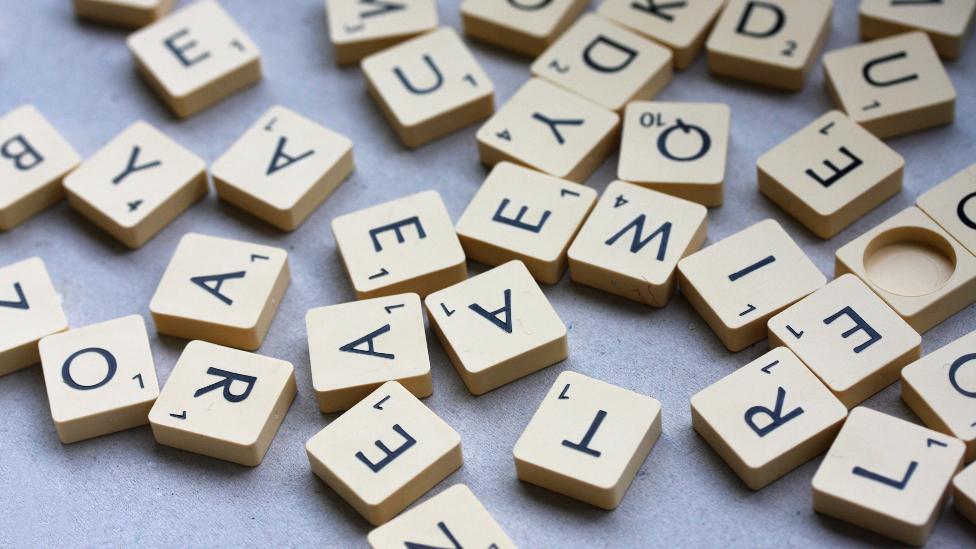
- Published13 January 2022
